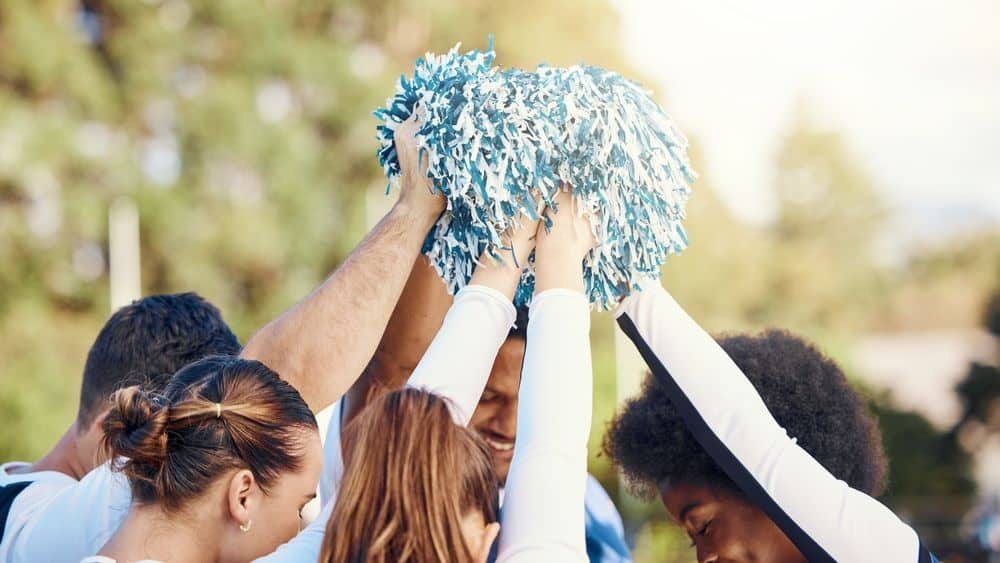
Cheer coach jobs are growing in demand as cheerleading becomes a respected sport and team activity across schools, competitive gyms, recreational leagues, and colleges. With more teams forming and competitions gaining national attention, the need for qualified cheerleading coaches is rising.
Whether you’re a former cheerleader, someone with a background in gymnastics or dance, or a new professional looking to support student-athletes, becoming a cheer coach can be a meaningful and fulfilling career.
This guide explains how to become a cheer coach, including the required certifications, how to find cheer coach jobs, and the compensation cheer coaches receive based on their role type.
You’ll also learn the skills required, the different coaching settings available, and how to stand out to employers, whether you’re applying to be an assistant coach, head cheer coach, or looking for a part-time position.
Types of Cheer Coach Jobs and How Much Cheer Coaches Make
Cheer coach jobs are available in various settings, including public schools, private gyms, and youth programs. Each role comes with its job description, pay scale, and expectations, depending on the level of coaching and commitment involved.
School Cheer Coach
Many cheer coaches work in schools, including middle schools, high schools, and colleges. A school-based cheerleading coach is typically responsible for planning practices, organizing cheers and dances for sports games, leading pep rallies, and ensuring that all routines adhere to safety standards. Coaches in these positions often work closely with the athletic director to coordinate schedules and meet the requirements of students.
At the middle and high school level, coaches may be teachers or school staff who receive a stipend. In some schools, particularly at the high school or college level, the cheer coach may hold a full-time position, combining classroom teaching with coaching duties. In these cases, salaries range from $35,000 to $60,000 per year, depending on location, experience, and the size of the school.
As a head cheer coach in a school setting, you’ll need to demonstrate knowledge of performance techniques, injury prevention, and team building. You’re not just teaching stunts—you’re mentoring students, promoting school spirit, and ensuring athletes grow both on and off the mat.
Competitive Cheer Coach
Competitive cheerleading has evolved into its distinct athletic field, featuring all-star teams, regional tournaments, and national-level championships. Competitive cheer coaches typically work at private cheer gyms or with traveling teams that perform year-round.
Unlike school teams, these cheerleading teams undergo intensive training in stunts, tumbling, and choreographed performances. Coaches must be skilled in spotting talent, designing effective routines, and preparing athletes for high-pressure competitions. They often work evenings and weekends to match the schedules of students and competition calendars.
In this setting, a cheer coach’s salary is higher, with full-time roles averaging between $30,000 and $70,000 per year. Gym size, regional demand, and level of experience all influence pay. These roles are ideal for coaches with a strong technical background who want to work with high-performing athletes.
Recreational and Youth Program Coach
Recreational programs and youth leagues provide a great entry point for new coaches or those seeking part-time cheer coach positions. These roles typically focus on younger children and beginners, introducing them to the basics of cheer, including cheers, dances, rhythm, and teamwork.
Coaches in this setting often work at community centers, YMCA programs, or city-run youth sports departments. The hours are flexible, and schedules are usually set in the afternoons or weekends. While the role is less intense than competitive coaching, it still requires a cheer coach who demonstrates knowledge of safety certification, child engagement, and basic performance instruction.
Salaries for rec coaches typically range from $10 to $18 per hour. It’s a great option for those balancing coaching with other jobs, school, or family responsibilities.
Cheer Coach Certification
Getting a cheer coach certification is one of the first steps in becoming a safe and effective leader. It shows that you’re serious about your role and committed to protecting the athletes you coach.
Most schools, gyms, and cheer programs require proof of training from a recognized organization, especially if you’re applying for a head cheer coach position.
Required Certifications and Organizations
Three main organizations offer widely accepted certifications for cheerleading coaches and administrators:
- USA Cheer (previously known as the American Association of Cheerleading Coaches and Administrators, or AACCA): Now merged with USA Cheer, this group provides safety certification, concussion training, and rules education. Their courses are trusted by schools and competitive programs across the U.S.
- NFHS (National Federation of State High School Associations): Offers a “Spirit Safety” course aimed at high school and middle school coaches. It focuses on safety rules, risk reduction, and emergency planning.
- USASF (U.S. All-Star Federation): Provides credentials for coaches working with competitive cheerleading teams. Their courses go deeper into spotting, tumbling progression, and athlete progression levels.
All of these programs help cheer coaches meet safety standards and teach the best practices for leading a team responsibly.
How to Get Certified
The process of earning a cheer coach certification is simple and flexible. Most organizations offer online courses that you can complete at your own pace. After registering, you’ll complete lessons on topics such as safety, emergency action planning, and athlete well-being. Some courses include quizzes or exams that you must pass to receive your certificate.
Depending on the program, certification can take anywhere from a few hours to a full day. Once completed, you’ll be issued documentation to include with your job applications or to submit to your athletic director.
Additional Credentials and Training
In addition to cheer-specific certifications, many employers require or recommend the following:
- CPR and First Aid Training: Ensures you can respond quickly to injuries or emergencies during practices or events.
- Concussion Awareness Courses: Teaches you how to recognize and manage head injuries, which are a common risk in cheerleading.
- Child Abuse Prevention and Background Checks: Confirms you’re safe to work with minors and understand how to protect their well-being.
- Safe Sport Training: Covers how to prevent bullying, harassment, and abuse—essential when coaching youth teams.
While these may not be part of your core cheer coach certification, they’re often required to meet insurance and legal requirements. Getting them ahead of time can give you a hiring advantage.
Key Skills Every Cheer Coach Needs

A successful cheerleading coach is more than just someone who can lead a routine. Cheer coaches must handle safety, communication, and emotional support, especially when working with younger team members.
Safety and Injury Prevention
Safety is non-negotiable in cheer. Coaches are responsible for creating a safe environment during stunts, practices, and games. This involves understanding proper spotting techniques, knowing when to stop a routine due to injury, and ensuring that all activities adhere to safety standards.
Having a strong foundation in injury prevention also helps avoid costly accidents. This includes planning warm-ups, limiting risky moves until athletes are ready, and recognizing signs of overuse or stress.
Leadership and Team Building
Cheerleading coaches and administrators often double as team motivators. Whether you’re an assistant coach or a head cheer coach, your attitude has a significant impact on the entire group. You must be able to keep practices organized, handle team drama with calmness, and build a positive environment.
Team building is an ongoing task, ensuring that all members feel valued, heard, and supported. A great cheer coach helps develop not just physical skills but also confidence, accountability, and trust among team members.
Choreography and Technical Expertise
A cheerleading coach must understand the technical side of the sport. This includes creating and teaching routines, managing timing, and incorporating creative stunts, cheers, and dances that match the event or competition.
Whether working at a high school, college, or in a private gym, cheer coaches are expected to stay current with rules, trends, and scoring systems. This often means watching competitions, attending workshops, and engaging in ongoing professional development to stay competitive.
Do You Need a Degree to Be a Cheer Coach?
One of the most frequently asked questions is whether a college degree is necessary to become a cheer coach. The answer depends on the setting.
In school-based programs, especially at the high school or college level, having a degree is often preferred or required. Schools may hire staff members who already work as teachers or require coaches to meet education-related requirements. If you’re aiming to coach at a public school, check with the district or athletic director to determine the specific qualifications required.
For competitive gyms and recreational leagues, a degree is usually not required. Employers in these settings value your cheer coach certification, hands-on experience, and ability to connect with athletes. Many cheer coaches in private programs start by assisting, build their reputation, and move into leadership roles without a degree.
In either case, professional development—such as workshops, clinics, and continued safety training—can be just as valuable as formal education.
How to Get Hired as a Cheer Coach
Securing a cheer coach position is about preparation, connection, and persistence. Whether you’re looking for part-time jobs or full-time positions, these steps will help you stand out.
Start by Volunteering or Assisting
One of the best ways to break into coaching is by volunteering or becoming an assistant coach. Many schools, gyms, and camps seek extra help, especially during competition seasons or summer programs. This gives you hands-on experience and helps you build relationships with athletic directors, gym owners, and team parents.
Complete Your Certifications
Having your cheer coach certification in hand shows you’re ready to take on responsibility. Start with safety training and expand into more advanced or specialized areas. Include these on your resume and let potential employers know you’re up to date on all required credentials.
Build a Strong Resume
Even if you’ve never coached before, your resume can highlight related skills. Include any experience in cheer, dance, gymnastics, or youth mentorship. Add your certifications, safety credentials, and any professional development or clinics you’ve attended. Ask current or former coaches, teachers, or supervisors to serve as references who can speak to your leadership and reliability.
Search for Jobs on the Right Platforms
Look for cheer coach jobs on school district websites, local gyms, sports job boards, and dedicated hiring platforms, such as JobsInSports. Many listings specify whether they’re looking for a head cheer coach, assistant coach, or part-time help. Check listings often, and don’t hesitate to reach out directly to programs you admire; you never know who might be looking for help.
Also, ensure that the employer is listed as an equal employment opportunity employer, which may broaden access to roles for qualified candidates regardless of their background.
Take the Next Step Toward Becoming a Cheer Coach

If you’ve ever thought about leading a cheerleading team, now is a great time to start. The demand for qualified, caring, and skilled cheer coaches is increasing across schools, clubs, and competitive teams.
By getting the right certifications, gaining experience, and applying with a strong resume, you can find a cheer coach job that fits your goals, whether it’s part-time at a rec center or full-time at a high school or college. Ready to begin your coaching career? Visit JobsInSports to explore cheer coach jobs, connect with employers, and access resources that support your growth as a cheerleading coach.




